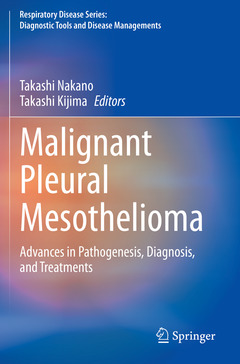Description
Malignant Pleural Mesothelioma, 1st ed. 2021
Advances in Pathogenesis, Diagnosis, and Treatments
Respiratory Disease Series: Diagnostic Tools and Disease Managements Series
Coordinators: Nakano Takashi, Kijima Takashi
Language: English
Subjects for Malignant Pleural Mesothelioma:
Malignant Pleural Mesothelioma
Publication date: 02-2022
352 p. · 15.5x23.5 cm · Paperback
Publication date: 02-2022
352 p. · 15.5x23.5 cm · Paperback
Malignant Pleural Mesothelioma
Publication date: 02-2021
352 p. · 15.5x23.5 cm · Hardback
Publication date: 02-2021
352 p. · 15.5x23.5 cm · Hardback
Description
/li>Contents
/li>Biography
/li>Comment
/li>
This book provides essential information on recent advances in molecular genetics, epidemiology, translational research, and the latest results of clinical trials on mesothelioma. Significant progress has been made in understanding mesothelioma biology, and in developing new therapies for this refractory tumor, malignant pleural mesothelioma (MPM). Not only does this volume summarize the latest research-based data on the disease; it also shares insights into future research directions.
The book consists of 5 themed sections on: epidemiology, pathogenesis, screening and early detection, molecular genetics, and clinical aspects and management. Several chapters focus on new trends in the field, e.g. immune therapy and identification of biomarkers, molecular oncogenesis including genetic susceptibility, and molecular diagnostic pathology. The book also highlights new cancer treatment approaches, such as immunotherapy based on immune checkpoint inhibitors, which has meanta paradigm shift in other types of cancer, and given some hope to MPM patients. In turn, it discusses recent molecular pathological studies on mesothelioma, which claim to offer more accurate classifications than traditional morphology and immunohistochemistry-based approaches. All of these cutting-edge analyses provide the basis for a closing discussion on future developments and research directions.
Malignant Pleural Mesothelioma - Advances in Pathogenesis, Diagnosis, and Treatments has been edited and authored by respected researchers and will be of interest to medical, surgical and radiation oncologists; pulmonologists; pathologists and basic researchers alike. Since the disease represents a significant diagnostic and therapeutic challenge, scientists and clinicians from learners to experts, as well as fellows in training in these subspecialties, will value this book.
Part I Epidemiology.- 1. Recent Trends in the Global Incidence of Mesothelioma: What is the Relationship with an Asbestos Ban?.- Part II Pathogenesis.- 2. Asbestos and mesothelioma: What is recent advance in research on asbestos-induced molecular carcinogenesis?.- 3. Asbestos fiber and immunological effects: Do immunological effects play any role in asbestos-related diseases?.- 4. Biomolecular pathways in mesothelioma: What is new perspective on biomolecular research for mesothelioma?.- Part III Screening and early detection.- 5. Biomarkers for mesothelioma screening: How can we identify subjects developing mesothelioma in asbestos-exposed high-risk group?.- 6. Pleural Plaques as a predictive imaging marker for cancer screening in asbestos-exposed subjects: Can pleural plaques be a tool beyond estimating past asbestos inhalation?.- Part IV Pathology.- 7. Anatomical structure of the pleura and mesothelial cells: What arethe characteristic features?.- 8. Histologic classification of tumors of the pleura: Advances after WHO 2015 classification.- 9. Pathology of mesothelioma, subtypes and rare variants: What is the role of immunohistochemical markers in differential diagnosis?.- 10. Cytopathologic diagnosis of mesothelioma: Can we diagnose mesothelioma based on fluid cytological materials without biopsy?.- 11. Circulating tumor cells in malignant pleural mesothelioma: What is the role of liquid biopsy in clinical practice of malignant pleural mesothelioma?.- Part V Molecular Genetics.- 12. Recent advances on the pathogenesis of mesothelioma in genetics and genomics: What are novel insights into mesothelioma biology?.- 13. Genetic predisposition to mesothelioma: What are the biological mechanisms and what are the clinical characteristics of these mesotheliomas?.- 14. Frequent NF2 inactivation in mesothelioma: How can we treat mesothelioma with targeted therapies formolecular aberrations?.- Part VI Clinical Features and Management.- 15. Use of Tunneled Catheters versus Pleurodesis for Mesothelioma: When should we use one or the other, or both?.- 16. Advanced minimally invasive approach with medical thoracoscopy for mesothelioma: What are the roles in diagnosis?.- 17. Imaging evaluation of local tumor growth in malignant pleural mesothelioma: What is the role of imaging modalities in curative intent surgery for mesothelioma?.- 18. 18F-Fluorodeoxyglucose positron emission tomography/computed tomography in malignant pleural mesothelioma: What is the role in mesothelioma detection and treatment response assessment?.- 19. Palliation in malignant pleural mesothelioma: How to manage clinical symptoms in mesothelioma.- 20. Supportive care for advanced mesothelioma: What is the role of mesothelioma nurses in clinical practice?.- Part VII Treatment; Current standard and future perspective.- 21. Antiangiogenic therapies for mesothelioma: What is the role in mesothelioma treatment?.- 22. Systemic chemotherapy for unresectable pleural mesothelioma from frontline to salvage treatment : How can we treat the patients failed to PD-1/PD-L1 inhibitors?.- 23. Biomarkers for Immune checkpoint inhibitors in mesothelioma: What are the roles of biomarkers for optimal immune therapy?.- 24. Promising investigational new drugs for mesothelioma: What is the next stage of the treatment for advanced mesothelioma?.- 25. Viral immune therapy and other virotherapies for advanced mesothelioma: Are we ready for clinical trials of viral immune therapy?.- Part VIII Radiotherapy.- 26. Impact of Radiation Therapy on Malignant Mesothelioma: Are we ready for use in clinical practice, combined with surgery or alone?.- Part IX. Surgical Intervention; Current status and future perspectives.- 27. TNM classification and the role of curative intent surgery for mesothelioma: Is the debate on extra-pleural pneumonectomy versus lung-sparing macroscopic resection over?.- 28. Surgery and adjuvant or neoadjuvant setting of radiotherapy: What is the role of radiotherapy in combination with lung-sparing surgery?.- 29. Loco-regional treatment with surgical intervention in mesothelioma: What is the role of enhancing local control approaches?.
Professor Takashi Nakano
Center for Respiratory Medicine, Osaka, Japan
Professor Takashi Kijima
Division of Respiratory Medicine, Department of Internal Medicine,
Hyogo College of Medicine, Hyogo, Japan
Provides essential information on molecular genetics, epidemiology, translational research, and the latest results of clinical trials on mesothelioma Consists of 5 themed sections: epidemiology, pathogenesis, screening and early detection, molecular genetics, and clinical aspects and management A valuable resource for medical, surgical and radiation oncologists; pulmonologists; pathologists and basic researchers alike In connection with occupational or environmental asbestos exposure, has significant implications for global social health issues
© 2024 LAVOISIER S.A.S.




